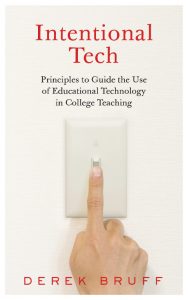Speaking
Presentations for Educators
Thanks to my writing and podcasting, I’ve been fortunate to get the chance to visit a variety of higher education institutions to give talks and lead workshops. I’ve lead dozens of interactive sessions in the United States and elsewhere, all aimed at developing more intentional creative, and effective educators.
See below for descriptions of the talks and workshops I’m often asked to give. I’m happy to adapt one or more of these talks to meet your teaching community’s needs or come up with something useful that goes in a different direction. If you’re interested in bringing me to your campus, please contact Jamie Brickhouse / redBrick Agency (jamiebrickhouse@redbrickagency.com).
Please note for in-person speaking engagements, I typically ask the host to cover my travel costs, including food and lodging, as well as provide an honorarium. For virtual engagements, I ask for a smaller honorarium. I’m happy to discuss specifics over email.
“Dr. Bruff’s presentation was clear, compelling and perfectly tailored to resonate with our Speaker Series audience. His examples were original, timely and effectively presented (cognitively and visually).” — Janet Rankin, Ph.D., Director, Teaching + Learning Lab, Massachusetts Institute of Technology
 Intentional Tech: Principles to Guide the Use of Educational Technology in College Teaching
Intentional Tech: Principles to Guide the Use of Educational Technology in College Teaching
Chalkboards and projectors are familiar tools for most college faculty, but when new technologies become available, instructors aren’t always sure how to integrate them into their teaching in meaningful ways. As faculty interested in supporting student learning survey the changing landscape of technology, determining what’s possible and what’s useful can be challenging. In this session, we’ll explore several teaching principles for matching technology to pedagogy, principles that can help us make intentional and effective use of technology in our teaching.
For more information about my 2019 book, Intentional Tech, visit my Books page.
“Derek’s focused keynote presentation and applied workshop session on ‘intentional technology’ affirmed and strengthened faculty’s investment in purposeful use of technology, especially in the in-person course context. Grounded in research on student learning, Derek expertly modeled different ways of engagement using technology and offered memorable images to remember the principles, such as ‘wheels on chairs.’ He conveyed sensitivity to our institutional context and paid special attention to ensure that his examples were applicable across disciplines and instructional settings.” – Gabriele Bauer, Director, Villanova University Institute for Teaching and Learning
Teaching and Learning in the Age of Generative AI
 With the advent of easy-to-use artificial intelligence (AI) text generation tools like ChatGPT, educators must grapple with what these technologies mean for their course and assignment designs. In this practical session, we will briefly survey the landscape of AI tools for generating text and other media, then dive into the teaching choices they present. What changes do we need to make to our learning objectives, if any, in light of ChatGPT and other AI tools? How can we design assignments that either leverage or minimize AI tools to meet those learning objectives? This session will feature teaching principles and examples of practice to help answer these questions as the AI landscape continues to change.
With the advent of easy-to-use artificial intelligence (AI) text generation tools like ChatGPT, educators must grapple with what these technologies mean for their course and assignment designs. In this practical session, we will briefly survey the landscape of AI tools for generating text and other media, then dive into the teaching choices they present. What changes do we need to make to our learning objectives, if any, in light of ChatGPT and other AI tools? How can we design assignments that either leverage or minimize AI tools to meet those learning objectives? This session will feature teaching principles and examples of practice to help answer these questions as the AI landscape continues to change.
“Dr. Bruff offers informed, patient, accessible, and helpful suggestions on a wide range of topics, from effective teaching techniques to educational and cognitive theory.” – Matthew Schneider, Associate Dean and Professor of English, High Point University
“Derek gave a wonderful workshop about ChatGPT, pointing away from a reactionary approach rooted in suspicion and toward the fundamental pedagogical practices that can help educators navigate this new landscape.” – Gina Hurley, Associate Director, Yale University Poorvu Center for Teaching and Learning
“Derek was the right speaker at the right time for our faculty. As all of higher education works to address Generative Artificial Intelligence, he was able to engage faculty in thinking about not only the current state of AI and what it means to syllabi and assignments, but also what the future might hold for these technologies. His blend of discussion, active learning, and live polling engaged faculty at all levels of comfort throughout his talk.” – Ed Finn, Director of Instructional Technology, Design, and Assessment, Valparaiso University
 Students as Producers: Creative Assignments for Deep Learning
Students as Producers: Creative Assignments for Deep Learning
In the courses we teach, we have the opportunity to engage our students not only as consumers of information, but producers of knowledge. Usually this means moving beyond the five-page paper to less traditional assignments and projects. In this introduction to the “Students as Producers” approach to course design, we’ll consider assignments that encourage students to tackle open-ended problems, to operate with a high degree of autonomy, and to share their work with wider audiences. We’ll also discuss teaching and assessment practices that support students as they engage in these kinds of assignments.
 All Skate: Active Learning in the University Classroom
All Skate: Active Learning in the University Classroom
How can we make the most of the relatively limited time we have with our students during class? Educational research is clear: engaging students in active learning in the classroom leads to improved learning outcomes over “continuous exposition by the teacher.” But what is active learning? Why does it work? And how can we engage all of our students in active learning during class? In this session, we’ll explore teaching strategies, learning principles, and digital technologies for creating active learning environments in our classrooms—and inviting all our students into deeper learning.
 See What I Mean: Visual Thinking Tools for Deep Learning
See What I Mean: Visual Thinking Tools for Deep Learning
Our brains are wired to rapidly make sense of and remember visual input. How might we tap into our students’ ability to think visually when teaching? In this session, we will explore ways that visual thinking tools such as concept maps, coordinate axes, timelines, and sketchnotes can help students refine, share, and receive feedback on their understanding of relationships among ideas. These tools can thus help students build more robust mental models useful for solving problems, thinking critically, and learning deeply.
 Teaching in Stereo: Strategies for Class Participation
Teaching in Stereo: Strategies for Class Participation
A year of teaching on Zoom showed faculty that having students participate using their voices isn’t the only meaningful kind of participation. How can we take a more inclusive, accessible approach to class participation in our classrooms, whether they’re virtual or in person? In this workshop, we’ll consider principles and practices to turn our classes into learning communities where students can learn from and with each other.
“Derek engaged faculty from a wide variety of disciplines in hands-on experiences during his workshop on strategies for participation. By the end of the workshop, it was clear that participants left with new ideas to implement in their own courses.” – Beate Brunow, Associate Director, Schreyer Institute for Teaching Excellence, Penn State“Derek provided an expert balance of engagement, content, and processing. This was practical, thought-stimulating, and engaging.” – Scott Hamm, Assistant Director, Adams Center for Teaching and Learning, Abilene Christian University
Presentations for Non-Educators
I have found that some of the principles and practices that educators use regularly in the classroom can help non-educators be better communicators and facilitators in other contexts. Below are a couple of talks exploring this idea that I can offer to businesses, non-profits, and other organizations. If you’re interested in bringing me to your organization, in person or virtually, please contact Jamie Brickhouse / redBrick Agency (jamiebrickhouse@redbrickagency.com).

